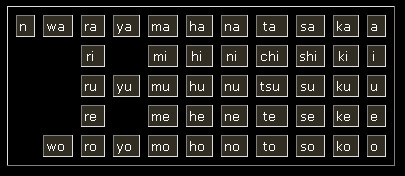If only I could make something like this up
The Japanese sound system is made up of 46 syllables. 21 additional sounds called "glides" are produced by combining certain of the main syllables, while 25 extra syllables result from "voicing" the sound of certain syllables.

Glides : By combining syllables ending in "i" with either ya, yu, or yo, glides are produced. The sounds are slurred together, smooshing (to speak technically) into a single syllable. Examples would be "ri + yu" = "ryu" and "ni + ya" = "nya." When written, the modifying ya/yu/yo character is written small and to the lower right of the parent syllable.
Voicing : Syllables in the columns headed by ka, sa, ta, and ha all have alternate voicings (ga, sa, da, and ba/pa, respectively). If there are rules for when to voice, I don't know them, and choose not to worry about them for the purpose of making up a character's name. Whichever of the pronounciations fits aesthetically, I use. When written, these syllables are marked by a double dash mark to the right and above the parent (the "p" modification to the ha series is noted by a small circle, in case you were dying to know).
Sound complicated yet? It isn't! All told, there are only approximately 96 sounds in the Japanese language. That sounds like a lot, until you consider the more-than-I-want-to-calculate number of possible sound combinations in English, where any given pair of letters may sound different together depending on what's before or after... Lord, I pity people learning English! Creating a name in Japanese comes down to simply mixing and matching syllables, from a limited pool of options, that sound good to you. While care might be taken to double-check that you haven't inadvertently reproduced the word for "slimy half-eaten worm," simply picking something that pleases your ears works for the casual roleplayer.
Things to skim through:
- The vowel sounds in Japanese never change. Never ever ever ever. Get it through your head; sing it to yourself in your sleep...
- "_a" is always pronounced as "ah" : kah, sah, tah...
- "_i" is always pronounced as "ee" : kee, shee, chee...
- "_u" is always pronounced as "oo" : koo, soo, tsoo...
- "_e" is always pronounced as "eh" : keh, seh, teh...
- "_o" is always pronounced as "oh" : koh, soh, toh...
- While "wo" technically lies in the w-sound arena, it's generally pronounced as simply "o," meaning it's not technically used (it shows up in written speech when the sound is used as a particle... now you know).
- N is the only consonant allowed to end a Japanese word (which isn't a problem, because all their other sounds have a vowel on the end, anyway).
- Japanese surnames tend to have between 3 and 5 syllables:
- Inaba ("ee-nah-bah")
- Matsumoto ("mah-tsu-moh-toh")
- Hayashibara ("hah-yah-shi-bah-rah")
- Japanese personal names usually lie in the 2 to 4 syllable range:
- Miho ("mi-hoh")
- Yumiko ("yu-mi-koh")
- Toshinobu ("toh-shi-noh-bu")
- Japanese names are said family name (surname) first, personal name second (i.e., I'd technically be introduced as Barrick Jennifer, although foreign names are usually said according to the foreign country's custom).
- Traditionally, female names were often "____ko" (one meaning of "ko" is child, or girl). Parents often picked an auspicious noun and tacked "ko" on the end (similar in idea to the Western girls' names Hope or Rose). While this practice is slowly falling out of favor with modern Japanese, female characters for, say, L5R would be likely to be named in this fashion.
- The male equivalent of this practice was that of naming sons using the counter "____ro" (literally the counter for sons). Hence common names such as Ichiro (first son), Jiro (second son), and Saburo (third son).
| Examples | Meaning |
|---|---|
Male Names
Female Names
Surnames
|
Male Names
Female Names
Surnames
|